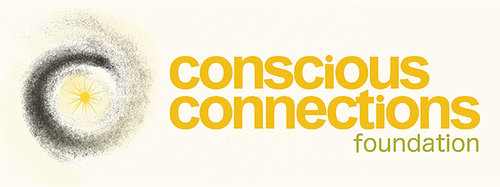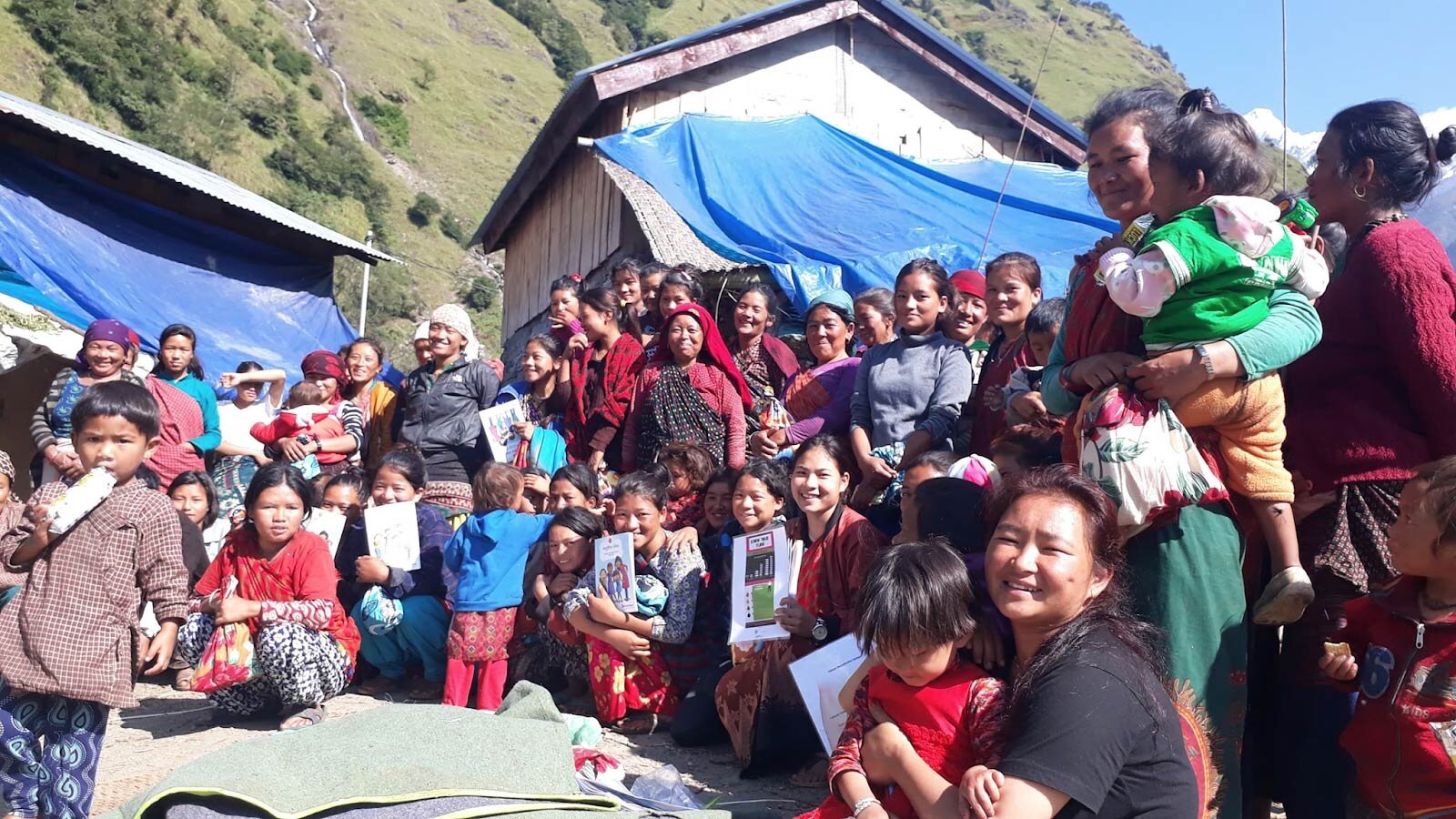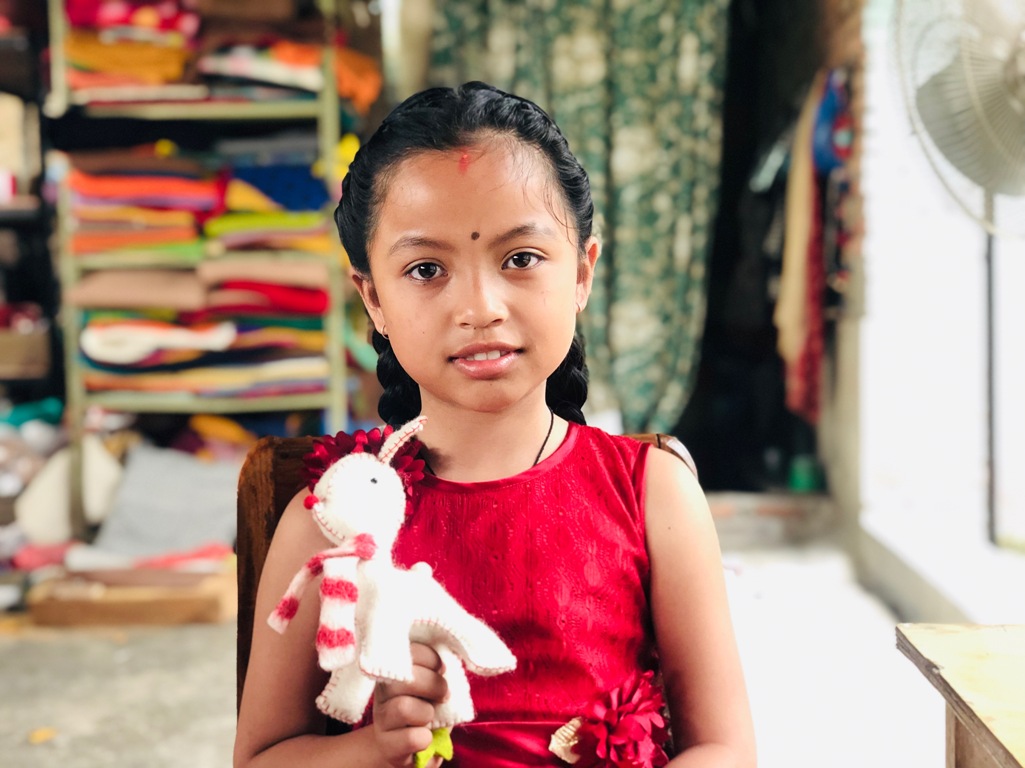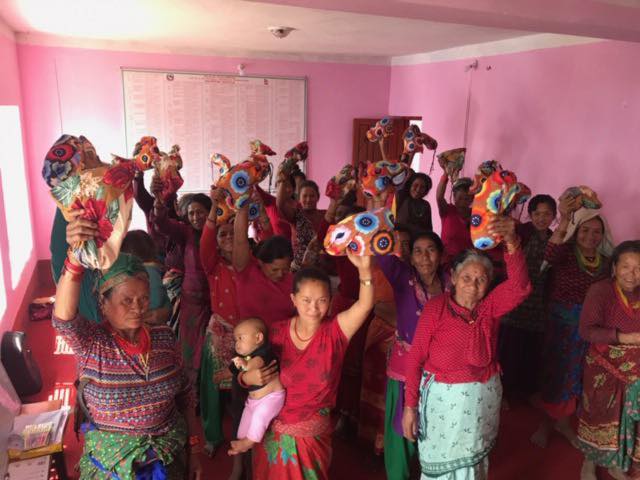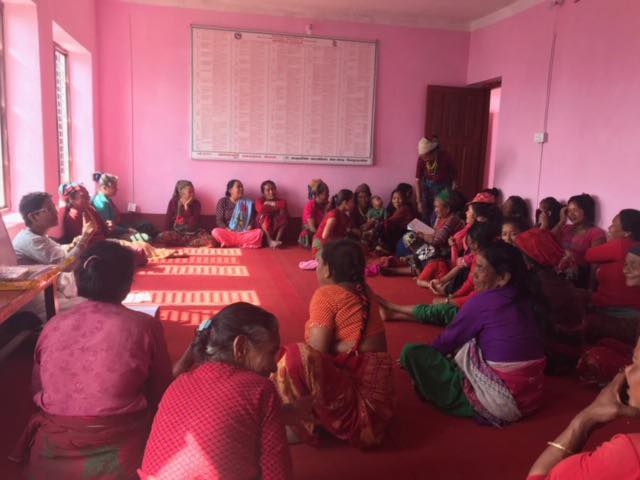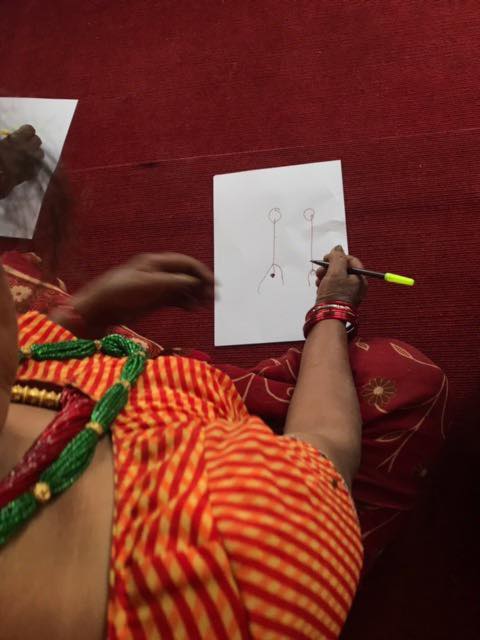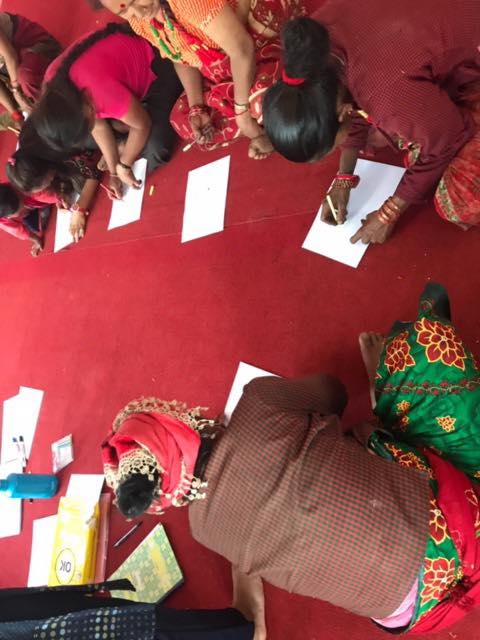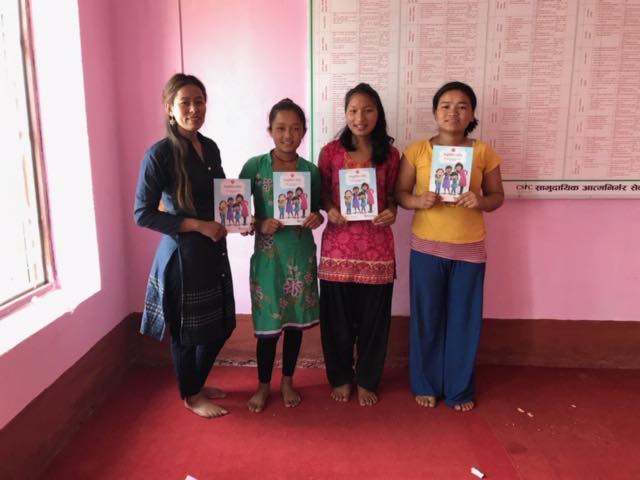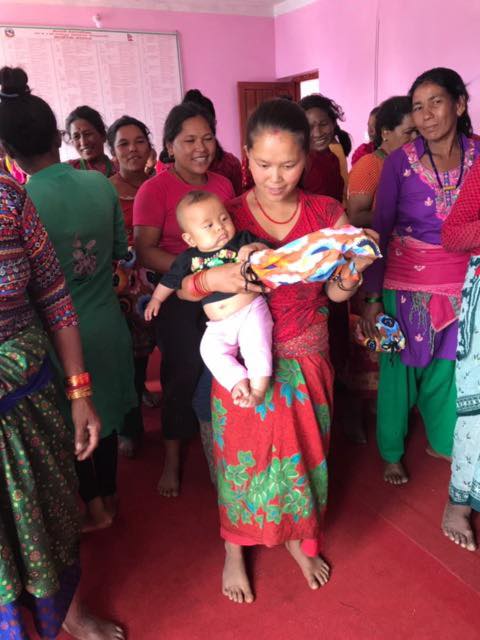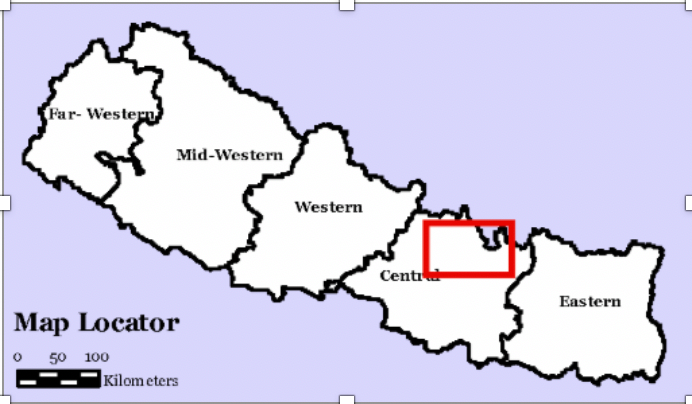Every worldview begins with a story, and mine is no different. It is the product of a lifetime of accumulated lessons, but sometimes certain junctures stand out. The biggest turning point for me was in 1984 when my husband Ric, and I, fresh from graduating with degrees in Environmental Science from Huxley College, decided to spend the next 8 months circumnavigating the globe. We were full of questions about parts of the world we had never engaged with and excited to talk to environmentalists in China, Nepal, Malaysia and New Zealand. Little did we know that this trip would change the course of our lives by sparking a life-long adventure in partnering with women and girls in Nepal to co-create a world where women have access to controlling their own money, making their own decisions and having a respected voice in all discussions.
In 1984, with no business experience, but armed with the desire to engage in a dream of economically empowering women handcraft producers in Nepal (while at the same time educating Westerners about the impact of our consumption), we launched Ganesh Himal Trading (GHT), a Fair Trade import business. No business professor we talked to believed we could run a business based on trust and relationship across two different cultures with vast economic disparities and no experience. But the women and men we wanted to engage with in Nepal thought differently, and together we replied “Who says we can’t do it this way?” At the
Laxmi Maharjan receiving award for her leadership of women weavers in Kirtipur, Nepal from Association of Craft Producers Executive Director Meera Bhatterai
same time asking, “What would it look like to have women hold money in their hands, have the tools and respect to envision and create their future, and have a voice at the table?” Fast forward to 2020 and we are still here, working with many of the same women, watching them use the money they now control, having educated their daughters and their communities, and having become formidable players in shaping their futures. There is still a long way to go, but they are changing their world.
But of course there’s always more to the story! As we saw women become economically empowered, we realized many other non-economic barriers, such as education and cultural taboos, still stood in the way of them thriving. To address those issues we talked with women in Nepal and we realized we needed an additional approach. In 2014, a team of us created the non-profit, Conscious Connections Foundation (CCF). The goal of CCF is to support women and girls in Nepal, through education, skills development and healthcare so they can become key participants in creating a healthy, inclusive society where women and girls thrive.
Heema Maharjan, first recipient of CCF’s Girls College Scholarship and mother celebrating the changes to her future life due to having access to education
Why focus on women and girls?
Why focus on women and girls? We focus on women and girls through our business and through the Conscious Connections Foundation because in our 35 years of experience in Nepal, we have watched the excitement in women’s eyes and the immensity of their impact as they understand their worth and intelligence. We have seen the sheer exuberance in girls as the doors to education and learning are opened for them and watched as they go on to change the trajectory of their families and their communities. We have seen the impact that education and steady work has on giving women options and choice; on marriage, family size, the health of their children, and controlling their finances.
We also focus on women and girls because we, as women, have so much wisdom to share and that wisdom is so needed at this time. As the natural world reacts to our unsustainable systems, people, animals, and ecosystems are displaced and destroyed and our existence on this planet is in peril. Everyone’s insight and perspective is needed now to create the new systems that will allow us to partner with, rather than dominate nature and each other. As Katherine Wilkensen states in her 2018 TED talk , “Women are vital voices and agents for change on this planet, and yet we’re too often missing or barred from the proverbial table.”
Ganesh Himal Trading and CCF believe we must vigorously act to provide women and girls access to the tools they need to participate to their fullest potential so that all of us can engage in and create the next systems we all need to thrive.
How does that happen?
How does that happen? Take the example of our Ganesh Himal and CCF partner, Kesang Yudron. We’ve known Kesang since she was born. Her parents, Namgyal and Pemala (both Tibetan refugees), started working with and providing products to Ganesh Himal Trading in 1985. Namgyal and Pemala had three daughters, and as refugees, understood the value of education. With stable earnings from their fair trade work, they invested in the education of their daughters, and all completed their undergraduate degrees. Their daughters also watched and learned as their mom and dad reached out to others, mainly less fortunate women, and provided them with steady work, training, and opportunity. In 2009, after finishing her degree in the U.S., Kesang returned to Nepal and, inspired by her parents, started her own Fair Trade business providing meaningful employment to over 50 women throughout Nepal. Ganesh Himal Trading has partnered with Kesang’s business since its inception and together we have helped producers gain economic stability and independence through consistent orders, fair wages, school scholarships for educating their children, and access to very low interest micro-loans through a co-funded worker development fund.
Kesang, her mother, Pemala, and sister, Chimme
Kesang’s interests, however, like GHT and CCF, didn’t stop with just economic empowerment. She has a keen interest in helping to remove other unseen barriers to girls and women in Nepal and has been an instrumental partner in the growth and development of CCF’s Menstrual Hygiene training program. In this program, CCF uses Nepali health workers to educate women and communities about menstruation, seeking to engage everyone in the discussion to dissolve long-held myths and taboos and help remove the stigma. CCF also provides girls and women with reusable menstrual pads so that girls and women can lead normal and healthy lives with quality, non-polluting menstrual aids. Kesang has organized leadership workshops for CCF in Menstrual Hygiene Management, set up a tailoring workshop employing a low income women to sew reusable menstrual pad kits, and with CCF support she is currently developing a Menstrual Hygiene educational manual geared toward educating women, girls and communities in remote areas where women have little or no education.
This one young woman has taken advantage of the opportunities of education, partnership, and the support of her family and community to change the world and our perceptions of how things can and should be done. She is providing grassroots avenues for women to thrive and engage.
Nilam and Kesang discussing the production of CCF reusable cotton menstrual kits
Another great example is the story of Pema Tamang and her husband Yogendra. We met them in their remote village of Sertung as we were surveying the damage after the 2015 earthquake. When we asked what they needed to rebuild, they responded that they needed work, and so together we looked at their skills, the difficulties of having to carry supplies into their village and what kind of products Ganesh Himal might be able to sell. We settled on using recycled silk saris (very light to carry for two days walk) and their wrapping skills to make trivets, bowls and vases. thirteen women have been making products for Ganesh Himal Trading now since 2016, and to date, over $35,000 has returned directly to the village. Recently, when evaluating this partnership, Yogendra said:
“When Toni Maya and Niri Maya Tamang work with Ganesh Himal Trading, they get big opportunities to earn money and they are very happy with this work. They use this money for their children’s school fees, health check-ups and medicines. They are very happy. They say a big thanks to Ganesh Himal. They told me, please keep continuing to give us this work. Thank you.”
Maya Tamang with her recycled sari basket creations
Women and children in this remote area of Nepal are getting opportunity, financial independence, access to education, and medicine through this work. But again, there is more to this story. Pema Tamang is a Certified Medical Assistant and has worked in health care in the Sertung area for many years. She approached Ganesh Himal and CCF because she believes strongly in girls’ education and women’s empowerment and she wanted to find out if we could help her get menstrual education and supplies into her remote area. The lack of understanding of women’s bodies and health, she felt, was a barrier to their advancement and the lack of menstrual supplies often kept girls out of school.
CCF, Kesang, Pema and Yogendra worked out a plan. In October of 2018 after attending a CCF sponsored leadership training in Menstrual Hygiene Education, Pema and Yogendra organized CCF’s first remote village Menstrual Hygiene workshops. Pema did the instruction and her husband, Yogendra, and her sister (a nurse midwife), helped as assistants. To date, they have provided educational day-long training to over 500 women and girls in the remote villages of Sertung, Lapa, Borang, Hindung and Neber, helping women learn more about their bodies, menstruation and the myths and taboos surrounding it. Through CCF, Pema has also been able to distribute over 500 reusable menstrual pad kits, made in Kesang’s workshop, to the women and girls attending these workshops. The programs have been so well received that women and men in this area have requested further, more in-depth training on women’s health so that they can gain greater understanding of women's bodies and reproductive health.
Pema Tamang educates women in Sertung on menstrual hygiene and women’s health
We have seen many “Kesangs and Pemas” blossom in Nepal through the years, and we realize that their stories should be every young woman’s story. Every woman should be given the tools and support necessary to participate with their greatest voice, without exception, at this level equally, if they desire. Their impact, in their communities is invaluable.
Can we imagine together a world where all girls and women are given this chance and support? Where women in their family are respected, heard and partnered with? Where women’s work and perspective become seen and is valued and understood as complementary to the work of the men we work alongside? A world where our voices and perspective in whatever arena can be lauded for evolving new systems and new ways engaging?
I say, “Yes we can”. This world is possible and being created at so many levels, by so many people and organizations as we speak. The Kesangs and Pemas of the world, when given the chance, are eager for the challenge. Fair Trade businesses like Ganesh Himal Trading and non-profits like Conscious Connections Foundation are just two examples of organizations that are working to bring women’s voices to the forefront. Look around you and you will see many more. The seeds of systemic change aimed at creating equality for women are being sown and nurtured.
What Now?
Where we are now reflects good and important work, and all who have participated in laying this path deserve great gratitude and acknowledgement, but women still do not have equal voice and we need to do more and we need to put laser focus on it. We need to dream even bigger because without women’s voices and women’s insights, our species survival is in greater danger. Education is key, as is access to quality voluntary reproductive health care and family planning. According to Katherine Wilkensen, one of the co-authors of Project Drawdown, “130 million 6-17 year old girls are still denied their basic right to education”. That is a staggering number when, as she states, access to education means:
“better health for women and their children, better financial security, greater agency at home and in society… more capacity to navigate a climate changing world… options, adaptability and strength. It can also mean lower emissions… and more years of education, [means women will] typically choose to marry later and to have fewer children.”
Education means women have more voice and more options. Coupled with “access to high-quality voluntary reproductive health care that allows women to have children by choice rather than chance,” women having access to these two services could actually result in “one billion fewer people inhabiting the earth…avoiding 120 billion tons of emissions” by mid-century. Combining educating girls and family planning makes “gender equity the top solution to restore a climate fit for life, more than on- and offshore wind power combined.” Yet, as Katherine also states:
“ it is estimated that just .2% of philanthropic giving goes specifically to women and the environment. 110 million dollars globally. This dynamic is unjust and is setting us up for failure.”
What are we waiting for? The time is now.
It is time to come together even more urgently than before and raise our collective voices in support of shifting our systems to those that engage all of humanity so that as a united community we can restore balance to the earth and create systems of inclusion and partnership that help benefit all. Women deserve it, men deserve it and the planet deserves it.
On this International Women’s Day, Sunday, March 8, 2020, we must ask: Why Women, Why Girls? Why Not! The wheels are already in motion for change. Let’s get on the bus. We must shout out to the world, “when women and girls thrive, the world is a better place.” This is a call to action, a call to evolve and a call to challenge and change the systems that keep women and girls from thriving. To start, we can fund programs like CCF’s Girl child education campaign and support the full funding of access to quality education for every girl. We can call for access and funding of quality voluntary reproductive health care and education for all women such as CCF’s Menstrual Education Program. We can support those who provide economic equality and advancement for all women, and most importantly we must seek out and loudly support those organizations, institutions, governments, and businesses that seek to create systems of equality & justice for all women. Our voice is strongest when we act together. The collective is our source of power and courage and we call for you to join us, on this International Women’s Day, as we dream in this new reality, of women as co-partners on this planet.
Three-day Menstrual Hygiene Leadership Training at the Association for Craft Producers Nepal
(photo credit Kesang Yudron)
Please donate to CCF today to help us carry out our mission of empowering girls and women through education for a more vital world.
